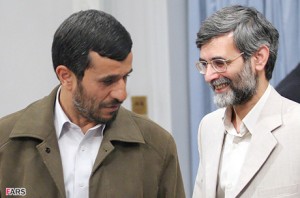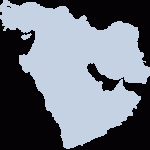
2210 GMT: Neda Propaganda Overkill. You might think it would be enough for Iranian state media that Caspian Makan, the reported fiancé of Neda Agha Soltan, had met Israeli President Shimon Peres (see separate entry). But, no, Press TV
has to go much, much farther:
One of the suspects believed to be involved in the killing of a young woman during Tehran's post-election violence last year has visited Israel.
Caspian Makan, who claims to be Neda Agha Soltan's fiancé, has met with Israeli President Shimon Peres, during his stay in Israel.
Makan was also interviewed as a guest on an Israeli TV channel.
Agha Soltan was shot dead far away from the riot scene on June 20. Western media accused Iranian security forces of killing her, but police rejected the allegations and said Neda was shot with a small caliber pistol which is not used by the Iranian police.
They have described the killing as a premeditated act of murder "organized by US and Israeli intelligence services."
NEW Iran: The Controversy over Neda’s “Fiance”
NEW Iran: An Internet Strategy to Support the Greens? (Memarian)
The Latest from Iran (23 March): Inside and Outside the Country
2140 GMT: Political Prisoner Watch.
Gooya reports that
more than 900 Iranians have signed a petition calling for the release of imprisoned student Omid Montazeri.
Montazeri was arrested in January after he approached the Ministry of Intelligence following the detention of his mother and guests at the Montazeri house.
2015 GMT: Rafsanjani Watch. On a slow news day,
Parleman News has not one but two features around Hashemi Rafsanjani.
The
top story on Rafsanjani's latest declaration is not that earth-shaking: the former President issues another fence-sitting declaration that "the majority of protesters are loyal to the regime", which allows him to back some public pressure on the Government while maintaining his own position of backing the Supreme Leader. No real change there.
More intriguing is
the appearance of Faezeh Hashemi, Rafsanjani's daughter. The content of the interview is not very subversive. Hashemi talks about her education and passion 4 women's sports as well as making the far-from-controversial assertion that her father wants the common good of society. It's the timing that matters: the interview comes a few days after the regime tried to shut Hashemi up by arresting her son, Hassan Lahouti.
1440 GMT: Sanctions Rebuff. Turkey, a non-permanent member of the United Nations Security Council, has added to the obstacles for tougher international sanctions on Iran. A
Foreign Ministry spokesman said, "There is still an opportunity ahead of us and we believe that this opportunity should be used effectively. Not less, but more diplomacy (is needed)."
(I am beginning to suspect that these moves might be political theatre, accepted if not directed by Washington. The Obama Administration's approach seems to be a public posture of the international route, primarily as a response to Congressional pressure, while carrying out the meaningful initiatives in bilateral talks with other countries and even with individual companies.)
1420 GMT: Today's Obama-Bashing. Alaeddin Boroujerdi, head of Parliament's National Security Committee, takes on the daily duty of
slapping down the US Government's approach to Iran:
[President Obama's Nowruz] comments were nothing but a deception. They (Americans) have sent several messages during the last year calling for talks with Iran, but at the same time passed more than 60 anti-Iranian bills in their Congress. As long as there is no sense of balance between their comments and actions, offering talks could be only a trick....Obama has lost his prestige among the world's public opinion, therefore his new year message has no value.
1400 GMT: On the Economic Front. This could be significant: The Russian energy firm LUKoil has announced
its withdrawal from an oil project in Iran "due to the impossibility of carrying out further work at the field because of the economic sanctions imposed by the U.S. government".
LUKoil has a 25 percent stake in the Anaran project; a Norwegian company, Hydro, has the other 75 percent. We'll see if this withdrawal sticks: LUKoil also announced in October 2007 that it was pulling out of the project, which encompasses Azar, Changuleh-West, Dehloran and Musian oilfields with reserves at the project sites estimated at 2 billion barrels, but it
resumed work two months later.
1200 GMT: We've
posted an editorial from prominent reformist journalist Masih Alinejad criticising Caspian Makan, the "fiancé" of Neda Agha Soltan.
0925 GMT: Political Prisoner Watch. Iran Human Rights Voice reports that
writer and women's rights activist Laleh Hasanpour was detained by Intelligence agents on 16 March and taken to an undisclosed location.
0745 GMT: Iran and Afghanistan. Readers have noted the latest wave of allegations, spurred by
The Sunday Times of London that
the Iranian Government is providing support, including funding and training, to the Taliban in Afghanistan.
I have been cautious in reporting the allegations, in part becaus
e The Sunday Times has been a handy channel in the past for those spreading "information" to discredit Tehran. Far more importantly, key US Government officials and military leaders are also
playing down the accusation. General David Petraeus, the head of US Central Command, has said any Iranian Government role in assistance is limited. Secretary of Defense Robert Gates echoes, "There is some [training], but it, to this point, I think, has been considered to be pretty low-level."
Lieutenant Colonel Edward Sholtis said on Monday, "We've known for some time that Iran has been a source for both materiel and trained fighters for Taliban elements in Afghanistan"; however, he added that US officials do not know if the training is "simply something that is happening beyond the government's control".
(hat-tip to an EA reader for raising the story and providing sources)
0730 GMT: With the Green Movement in a quiet phase (defeated, intimidated, or just lying low?), attention is on the continuing battle between elements of the regime and Hashemi Rafsanjani.
Iranian authorities released Rafsanjani's grandson Hasan Lahouti yesterday, albeit on $70,000 bail, and they had to let go the former President's ally Hassan Marashi after a short detention. The anti-Rafsanjani campaign is far from over, however.
The latest assault comes from Gholam-Hossein Elham, a member of the Guardian Council. In
a lengthy "unpublished interview" which somehow is published on Fars, Elham details post-election subversion. Specifically, he targets Rafsanjani for Friday Prayers addresses which did not support the Government and thus opened the way for illegal protest and manoeuvres to undermine the Islamic Republic.
So a question: is the sustained assault on Rafsanjani a sign of regime confidence that, having vanquished the opposition outside the system, it can move aggressively against challengers within? Or is it an indication that this is a Government which will never feel secure in its supposed legitimacy?
 Thursday, March 25, 2010 at 13:26
Thursday, March 25, 2010 at 13:26  Almost three weeks after Iraq's national election, with the outcome still unclear, the BBC offers this summary:
Almost three weeks after Iraq's national election, with the outcome still unclear, the BBC offers this summary: Ayad Allawi,
Ayad Allawi,  BBC,
BBC,  Faraj al-Haydari,
Faraj al-Haydari,  Nouri al-Maliki in
Nouri al-Maliki in  Iraq
Iraq  Ayad Allawi,
Ayad Allawi,  BBC,
BBC,  Faraj al-Haydari,
Faraj al-Haydari,  Nouri al-Maliki in
Nouri al-Maliki in  Iraq
Iraq 


